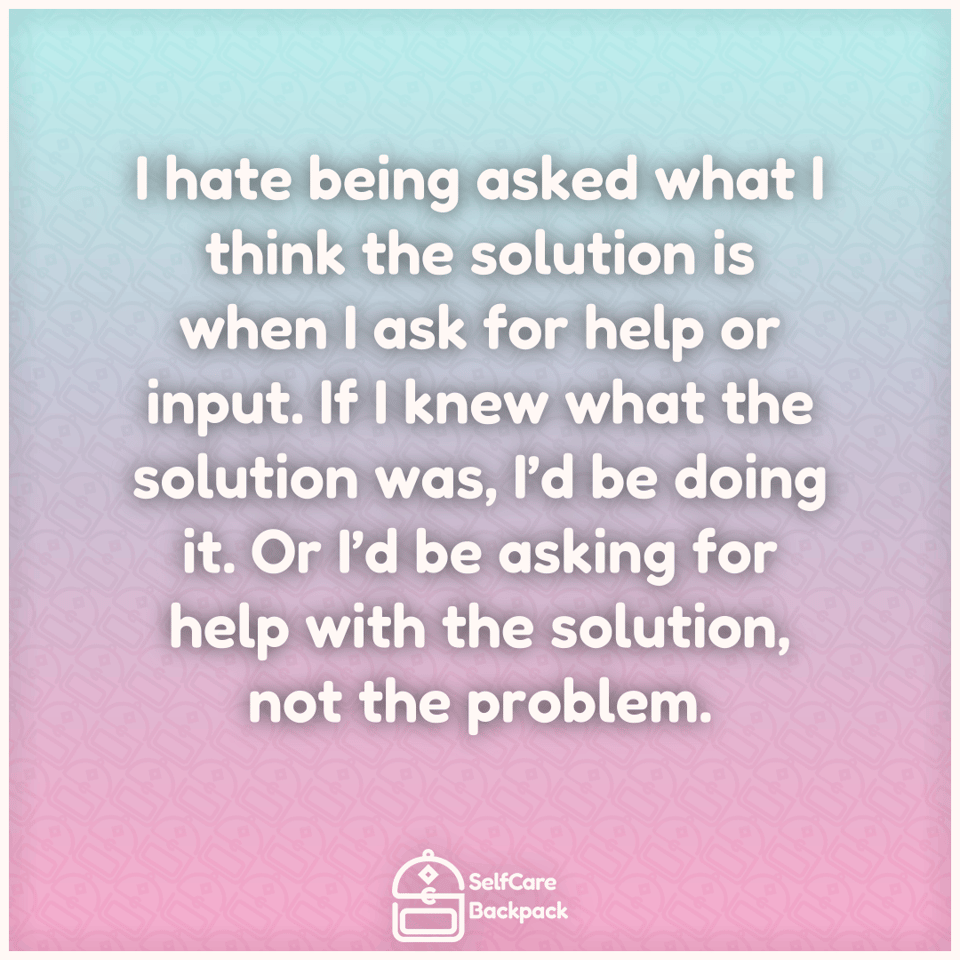What have you thought about and discarded?
I was once having trouble at work. I was working at the intersection of multiple teams and trying to figure out interfacing, continuity, and confidence as things were passed from one to another. There was a lot of history and the teams were really fast-paced, which meant I was having trouble figuring out small ways to nudge teams into the right directions. So after banging my head against multiple walls and many repetitive conversations, I asked my boss for help.
What do you think the solution is?
I hate being asked what I think the solution is when I ask for help or input. If I knew what the solution was, I’d be doing it. Or I’d be asking for help with the solution, not the problem. I find it difficult to ask for help, and so doing that and being met with what felt like a deflection back to me meant I just…didn’t bother asking for help. If the response to asking for help is someone implying I should have the solution as well, I may as well just continue to struggle by myself(hyper-competence meets stubbornness, I guess). I understand we want to help people find the answer, rather than give them the answer, but there are ways of doing that that
Acknowledge the issue is complicated
Don’t deflect the problem immediately back to the person asking for help
Still allows you to coach that person to come up with a solution, or work together to find the solution
I get why the question is asked! I just feel like there are better ways to invite someone in to workshop a problem and a solution.
Maybe asking what I think the solution is was a way of asking what wasn’t going to work, and I’ve always misread that question, but it feels deflective, very ‘this is a you problem to solve’, and being clear is always better.

My boss didn’t ask me that, he asked me:
What have you thought about and discarded?
Being asked what I had already thought about and discarded was an excellent question. It invited me to share what thoughts I’d already had. It meant my boss got the context of the bits that made this situation difficult. I ended up giving him an overview of the situation, but also narrowed down to the bits I was struggling with in particular. Instead of me flopping around trying to think of a solution I didn’t have in my brain, I spoke through why my normal methods wouldn’t work and things that had failed in the past. We didn’t really come to any conclusions, but he empathised with my struggles, offered some ideas, and offered his power as my boss and senior staff in order to help get some time and work from teams.
It was a really good way for us to work together on a problem.
I think about this question a lot, actually.
I have an older talk on why responding to someone talking about their mental health struggles with ‘have you tried x?’ (where x is anything from therapy to focusing on the bright side) is unhelpful at best.
It’s much better to start with empathy and accept and attempt to understand before moving straight to solutionizing. This allows you to understand the problem more fully, and if a solution is needed, you can work on that with the other person. It’s an invite to hear the other person and join them in the process.
It’s also possible that inviting that person in gives them a floor to work through the problem out loud, or in a different way, and find a solution themselves. The assumption that I have thought of things and discarded them was a reminder that I have had ideas, and I’ve discarded them for valid reasons, and that I know the problem space well. I might not know the solution, but I’ve definitely investigated the problem.
It reminded me that I was competent, at a time where I was really struggling to feel like I was making any difference whatsoever.
It’s similar to my self care coaching. I start by asking people what things have worked (or not) for them in the past. What’s working right now? Where do we start from? And even if the client says they have no real idea, we can work on it together. It’s not me jumping in and assuming anything. Coaching is inherently participatory. It’s two (or more) folks against a problem, not one person being told to find a solution to something they haven’t got a solution for.
So next time someone asks for help, take a beat to listen, empathise, and assume they’ve thought about solutions and still need help.
This newsletter is free; feel free to share with anyone who you think will find it useful. It’s also entirely reader-supported, so if you like what you read, you can upgrade to a paid subscription to get writing every single week!
Add a comment: